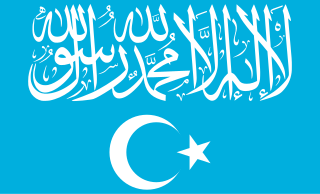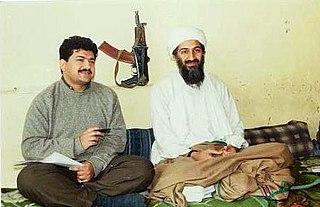
Osama bin Laden was a Saudi Arabian-born Islamist dissident and militant leader who was the founder and first general emir of al-Qaeda, a militant terrorist organization espousing Islamism, pan-Islamism and jihadism. Bin Laden participated in the Afghan mujahideen's jihad against the Soviet Union during the Soviet–Afghan War, and supported the Bosnian mujahideen during the Yugoslav Wars. Opposed to the United States' foreign policy in the Middle East, Bin Laden declared war on the U.S. in 1996. He supervised international terrorist attacks against Americans, including the September 11 attacks inside the U.S. in 2001.
There were many video and audio recordings released by Osama bin Laden between 2000 and his death in 2011.

The Turkistan Islamic Party (TIP) is a Uyghur Islamic militant organization founded in Pakistan by Hasan Mahsum. Its stated goals are to establish an Islamic state in Xinjiang and Central Asia.
Wadih Elias el-Hage is a Lebanese and naturalized American citizen, who is serving life imprisonment in the United States based on conspiracy charges relating to the 1998 United States embassy bombings.

The bin Laden family, also spelled bin Ladin, is a wealthy Hadhrami family intimately connected with the innermost circles of the Saudi royal family. It is the namesake and controlling shareholder of the Saudi Binladin Group, a multinational construction firm. Following the September 11 attacks, the family became the subject of media attention and scrutiny due to the activities of Osama bin Laden, the former head of al-Qaeda.

The Darunta training camp(also transliterated as Derunta) was one of the most well-known of many military training camps that have been alleged to have been affiliated with al Qaeda.
Afghan Arabs were the Arab Muslims who immigrated to Afghanistan and joined the Afghan mujahideen during the Soviet–Afghan War. The term does not refer to the history of Arabs in Afghanistan before the 1970s. Despite being referred to as Afghans, they originated from the Arab world and did not hold Afghan citizenship.

Hasan Mahsum, also known as Abu-Muhammad al-Turkestani and Ashan Sumut, was an Uyghur militant who was the leader of the Turkistan Islamic Party, an Islamic extremist group suspected of having ties with Al Qaeda. He was shot dead in a counter-terrorism operation on October 2, 2003 by the Pakistani Army.
The Battle of Jaji was fought during the Soviet–Afghan War between Soviet Army units, and their allies of the Democratic Republic of Afghanistan against Maktab al-Khidamat in Paktia Province. This battle occurred in May 1987, during the first stage of withdrawal of Soviet forces from Afghanistan. The objective was to relieve a besieged garrison at Ali Sher, and cut off supply lines to the Mujahideen from Pakistan. The battle is primarily known for the participation of the Arab foreign fighter and future founder of Al Qaeda, Osama bin Laden, who acquired his reputation as a divine jihadist warrior as a result of the Mujahideen victory during this battle. Bin Laden led a group of some 50 Arab foreign fighters during this battle, of which at least 13 were killed in action.

Several sources have alleged that the Central Intelligence Agency (CIA) had ties with Osama bin Laden's faction of "Afghan Arab" fighters when it armed Mujahideen groups to fight the Soviet Union during the Soviet–Afghan War.
Osama bin Laden, a militant Islamist and co-founder of al-Qaeda, in conjunction with several other Islamic militant leaders, issued two fatawa – in 1996 and then again in 1998—that military personnel from the United States and allied countries until they withdraw support for Israel and withdraw military forces from Islamic countries. He was indicted in United States federal court for his alleged involvement in the 1998 U.S. embassy bombings in Dar es Salaam, Tanzania and Nairobi, Kenya, and was on the U.S. Federal Bureau of Investigation's Ten Most Wanted Fugitives list until his death.
The Asian Muslims Human Rights Bureau was a group said to have been organized to aid Muslim expatriates in Asia that had ties to Osama bin Laden and Al-Qaeda. It was reported to have been led by a "Pakistani citizen of Xinjiang origin" -- a Uyghur named Abdul Rasul.

Since the early 1990s, several interviews of Osama bin Laden have appeared in the global media. Among these was an interview by Middle East specialist Robert Fisk. In the interviews, Bin Laden acknowledges having instigated bombings in Khobar, Saudi Arabia in 1996 and Riyadh, Saudi Arabia in 2003, but denies involvement with both the 1993 and 2001 attacks on the WTC towers in New York City.
Jumaboi Ahmadjonovich Khodjiyev, better known by the nom de guerreJuma Namangani, was an Uzbek Islamist militant with a substantial following who co-founded and led the Islamic Movement of Uzbekistan (IMU) with Tohir Yo'ldosh. The IMU received substantial Taliban patronage, and was allowed to operate freely in northern Afghanistan.
Called together in the Sudan by Hassan al-Turabi, the 1991 Popular Arab and Islamic Congress Conference sought to unify Mujahideen and other Islamic elements in the wake of the Soviet withdrawal from Afghanistan and the Iraqi defeat in the Gulf War. It sought to provide an alternative to the Saudi-dominated Organization of the Islamic Conference, although it did not have its financial means.
Uyghurs in Pakistan are a small community of ethnic Uyghurs who live in Pakistan that originate from Xinjiang, China.

On May 2, 2011, United States President Barack Obama confirmed that al-Qaeda leader Osama bin Laden had been killed in his compound in Abbottabad, northeastern Pakistan. Bin Laden's death was welcomed by many as a positive and significant turning point in the fight against al-Qaeda and related groups. Those who welcomed it included the United Nations, European Union, NATO, and some nations in Asia, Africa, Oceania, South America, and the Middle East, including Yemen, Lebanon, Saudi Arabia, India, Israel, Indonesia, Somalia, the Philippines, Turkey, Iraq, Australia, Argentina, and the rebel Libyan Republic.

The 2011 Kashgar attacks were a series of knife and bomb attacks in Kashgar, Xinjiang, China on July 30 and 31, 2011. On July 30, two Uyghur men hijacked a truck, killed its driver, and drove into a crowd of pedestrians. They got out of the truck and stabbed six people to death and injured 27 others. One of the attackers was killed by the crowd; the other was brought into custody. On July 31, a chain of two explosions started a fire at a downtown restaurant. A group of armed Uyghur men killed two people inside of the restaurant and four people outside, injuring 15 other people. Police shot five suspects dead, detained four, and killed two others who initially escaped arrest.
Abdul Rasul is an Arabic male given name, meaning servant of the prophet.

The 1988 Gilgit massacre was the state-sponsored mass killing of Shia civilians in the Gilgit District of Pakistan who revolted against military dictator Zia-ul-Haq's Sunni Islamist regime, responsible for vehement persecution of religious minorities as part of its Islamization program.








